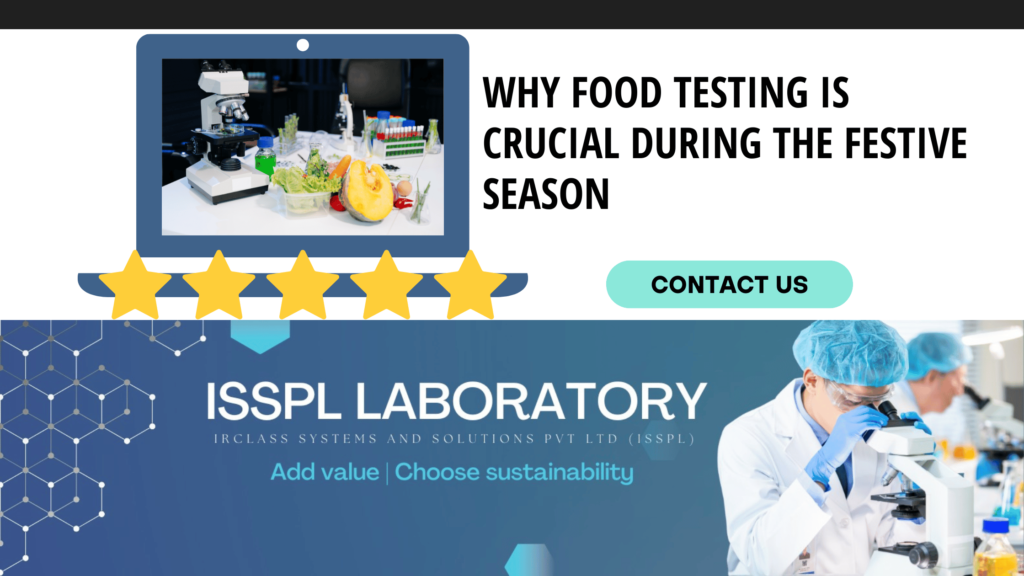An Overview by Team ISSPL - Analytical Testing Laboratory in India
ToggleDuring Diwali, food moves faster than usual. More sweets are made. More snacks are packed. More gifts are shared across homes and businesses. With that kind of scale, the chances of error also rise. Food might look fresh and festive, but it may not always be safe.
Many food items sold during Diwali are made quickly to meet rising demand. This often leads to shortcuts that can put health at risk. Ingredients might be altered. Hygiene standards might be skipped. Products might be packed without proper checks.
These are not just rare cases. They happen every year. The only way to catch them early is through proper testing.
Why does adulteration increase during the festive rush
When sales go up fast, supply chains get stretched. This gives room for low-cost ingredients along with harmful substitutes to enter the system.
Items like khoya, paneer and ghee are often targeted because they are expensive to make. During Diwali, they might be mixed with starch, soapstone or low-grade oils. These materials look similar but do not behave the same once consumed.
The goal for sellers is often to keep the cost down without making the product look different. That is where the risk begins.
What kinds of products need the most attention
Some foods spoil faster than others. Some carry a higher chance of adulteration. During Diwali, these are the ones to watch closely.
- Milk-based sweets like rasgulla, peda, and gulab jamun
- Ghee and oil are used for cooking, along with frying in bulk
- Dry fruits that may be polished or chemically treated for shine
- Flour and spices are used in snacks or festive preparations
- Packaged mixes with long shelf claims and unclear labeling
These foods are either high in moisture or high in demand. Both factors can increase the chances of error.
How adulteration affects health during festive consumption
Many adulterants do not change the taste or smell of food. They blend in with natural ingredients. This makes them hard to detect without lab tests.
Some adulterants affect the digestive system. Others can impact internal organs over time. Synthetic color in sweets may cause skin issues or stomach irritation. Contaminated ghee can lead to liver strain. Excess starch in milk solids may upset the gut balance.
None of these problems is visible right away. But repeated exposure can leave long-term effects on people across all age groups.
Food testing helps find problems early, before food reaches the consumer
Testing is not about doubt. It is about clarity. It helps confirm whether the food is safe to sell or serve.
During festive production, food moves fast. Testing helps catch issues that may be missed during manual checks. It also helps vendors meet safety rules set by local and national bodies.
Labs test for things like chemical residues, along with microbial growth and physical properties. These tests can confirm if a product has been mixed or stored incorrectly.
What labs actually check when they test food during Diwali
Labs do not guess. They run each product through standard methods using calibrated instruments and trained professionals.
Here is what a lab might test in a typical Diwali food sample:
- Total fat content in ghee, along with oil purity markers
- Moisture and microbial presence in milk-based sweets
- Heavy metals in dry fruits and silver coatings
- Synthetic dye in colored sweets or snack items
- Preservatives in packaged festive mixes
Each of these tests has set limits. Results are compared against those limits to confirm whether the food is safe.

Who needs food testing during the festive season?
Testing is not only for factories. It helps everyone involved in food. That includes shop owners along with exporters and caterers.
Shops that sell sweets in bulk can test batches to avoid returns or complaints. Exporters need test reports to meet foreign rules. Caterers serving large groups need to know that their food is safe.
Even businesses giving festive food as gifts can get sample tests done. It helps them avoid legal or health issues in case anything goes wrong.
Sweets need special care due to their short shelf life.
The sweets that are sold at Diwali usually remain open longer. Before they reach the final buyer, they are exposed to air and handled by a large number of people.
They do not last long on shelves since most of them are prepared using milk or ghee. Unless they are stored correctly, they may become bacteria-ridden. That is more dangerous when sweets are prepared in bulk and not tested frequently.
Testing assists in monitoring freshness as well as hygiene. It also aids in the verification of additives that are employed to provide color or shelf life, and that are within acceptable ranges.
Storage and transport can affect food quality even after testing
A good test result does not guarantee that food stays safe. Storage and transport play a significant role in quality control.
Food should be stored in clean, dry and cool places. Dry fruits should not be exposed to direct light or heat. Sweets should not be stacked in open trays for too long.
Suppose food is packed in large boxes or gift hampers, temperature and handling need to be checked. Some products may need cold storage even after testing.
Testing helps maintain trust during the festive rush
Most buyers will never ask for a test report. They trust that the food is safe. That trust can break fast if something goes wrong.
Testing helps vendors protect that trust. It shows that they care about safety. It also gives them proof if a problem is raised later.
During Diwali, that kind of trust matters more. People are giving food as gifts. They are serving it to guests. No one wants that gift to turn into a health issue.
Final thought
Diwali should be a time to celebrate. But when food is handled in large volumes without checks, it can create a serious risk.
Whether you are producing, selling or gifting food this season, testing helps you move forward with confidence.
About ISSPL Laboratory
ISSPL Laboratory supports food safety across seasonal and year-round production. Their lab tests food, water and related samples across chemical and microbial categories. With trained staff, strong lab systems and pan-India sampling, they help businesses reduce risk and improve food quality during high-demand periods like Diwali.
FAQs
1: What does food testing actually check during Diwali?
Food testing checks if the product has been altered or contaminated during preparation, along with storage and packaging. It looks for unsafe chemicals, microbial growth and other signs that the food is not safe to eat. Each sample is tested based on what kind of item it is and how it is likely to be used.
2: Who should get food tested during the festive season?
Any business that sells or distributes food in bulk should consider testing before products reach the consumer. This includes sweet shops along with caterers and exporters. If the food is being gifted or sold widely, testing helps reduce risk for both the buyer and the seller.
3: Can testing help avoid problems with food authorities?
Yes. Testing gives proof that your food meets safety standards and has been checked before sale. If a sample is picked up by food authorities during Diwali checks, a test report helps show that you followed proper steps to maintain quality.
4: What are the most common Diwali foods that need testing?
Milk-based sweets, along with ghee and dry fruits, are high-risk products during the festive season. They spoil faster and are often targeted for adulteration. Packaged snacks with long shelf life also need checks to confirm that preservatives and colors are within safe limits.
5: How fast can testing be done during high-demand seasons?
Many labs offer quick turnaround for urgent testing during Diwali. Timing depends on the number of samples and the type of test required. Some results take one day, while others may take two to three days if more detailed checks are needed.







